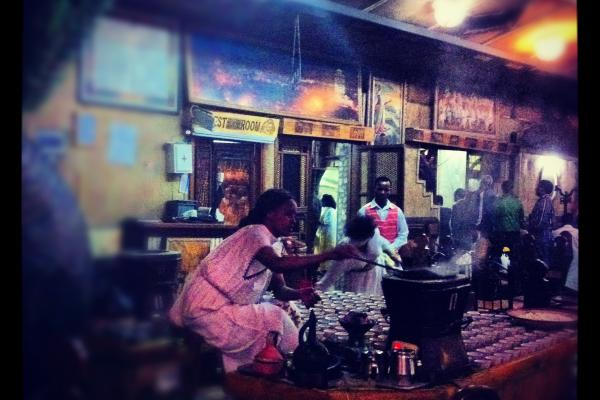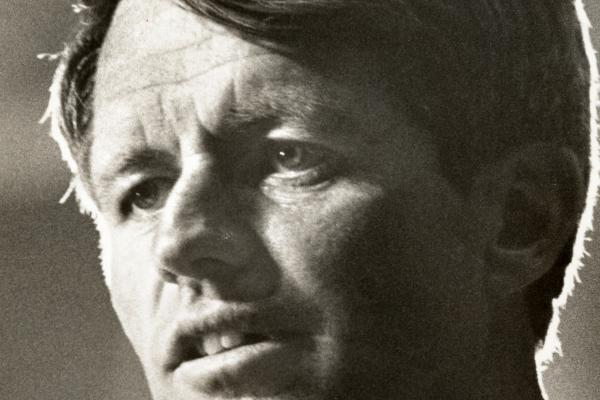On Saturday, Sojourners sent a group of staff members sailing down the Anacostia River.
But this was no pleasure trip.
Dottie Yunger, from the Anacostia Watershed Society, teamed up with Sojourners’ Creation Care campaign to teach some of our staff and a few other members of the local community about the state of the Anacostia river, how we as people of faith can be better stewards of our God-given resources, and how we can help create a healthier system where all creatures (both human and non-human) can survive and flourish.
Here are a few reflections from the trip.
"Do you think he'll sing?" the girl in the row behind me wondered aloud.
"I hope so," the young fellow beside her said before continuing, "My dad would freak. He was a big fan of U2 when I was growing up. He used to play this one album, The Joshua Tree, over and over again."
His father was a fan.
I am a thousand years old, I thought to myself, as more Georgetown students filled the seats around me at the university's 111-year-old Gaston Hall, the main lecture hall on campus named after Georgetown's first student, William Gaston, who later served as a member of the U.S. Congress.
The hall, decorated with stunning art-deco-era frescos and the crest of every Jesuit institute of higher learning, has hosted many dignitaries over the years, including Presidents Obama and Clinton, Vice-President Al Gore, Secretary of State Hillary Rodham Clinton, and Supreme Court Justice Antonin Scalia, to name but a few.
"So if he's not going to sing, is he just going to talk," another student asked, with a distinct whiff of disappointment in his voice.
"I hear he's an awesome speaker, though," still another student said.
The students who packed the auditorium, many of them from Georgetown's Global Social Enterprise Initiative at the McDonough School of Business and more than a few donning black t-shirts with the insignia of the ONE Campaign (of which Bono is a co-founder), weren't sure what to expect from the famous Irish rock star and humanitarian.
A concert? A lecture? Another boring speech?
I'm fairly certain none of the students present for Monday night's event, sponsored by the Bank of America and The Atlantic magazine, anticipated hearing Bono, the 52-year-old lead singer of U2, preach.
But preach he did.
Back home in California, we recently purchased one of those one-cup-at-a-time Kuerig coffee makers after running through two high-end traditional coffee machines in 18 months. (Two writers in one house equals a high rate of coffee consumption.) While I think it was the proper choice for us – we waste less coffee this way, and have bought one of those reusable pods so that we’re not always using recyclable-but-still-plastic-and-not-terribly-ethical disposable pods pre-filled with the coffee of our choice.
I brought home a pound or so of ground coffee from Ethiopia and we’ve tried to get the amount of grounds and water pressure just right to replicate the drink I’d had in Africa.
Nothing doing.
Ethiopian coffee ceremony a la Keurig is too fast, too easy, and much too weak in myriad ways.
In coffee ceremonies back in Africa, the beans were ground by hand with a mortar and pestle. They’d be uneven. Chunky. When steeped, the coffee needed to be sieved over and over to make the final product perfectly potable. It took time, patience, and a practiced hand. It also required a different kind of regard for the act itself: the woman preparing the coffee wasn't simply making a drink. She was presiding over something humble and holy.
Even if I could replicate the grounds (I do have a Le Creuset mortar and pestle that mostly serves as decoration on my kitchen window sill), and sieved the elixir until it was just right, it still wouldn’t be.
Why? No frankincense and all the sacred intention that comes with it.
The Los Angeles Times reports:
As the head of Focus on the Family, Jim Daly might be considered one of the nation's leading culture warriors — a title that certainly applied to his predecessor, James Dobson, who founded the organization and built it into a powerhouse of the conservative evangelical movement.
And, to be sure, Daly threw the considerable resources of his organization — which fiercely opposes abortion and same-sex marriage — behind the campaign to defeat President Obama, paying for millions of mailers that listed the presidential candidates' positions on issues that were important to “values voters.”In the aftermath of the election, however, Daly is willing to say things that few conservative evangelical leaders are likely to say. He believes, for instance, that the Christian right lost the fight against same-sex marriage in four states in part because it is on the losing side of a cultural paradigm. He says the evangelical community should have been considering immigration reform years ago, “but we were led more by political-think than church-think.”
Read more here.
When I stepped back and really thought about what I was experiencing on election night, I started thinking about the night of April 4, 1968, just hours after Martin Luther King, Jr. was assassinated. Having not yet been born, I thought about the coverage of it that I’ve seen. About how Robert Kennedy found himself in front of a crowd of supporters for a presidential campaign rally in Indianapolis. Many there that night were black and hadn’t heard the news of King’s death. As he did with most difficult topics, Kennedy laid it all out there. The crowd gasped and screamed and cried. Kennedy said he understood the anger and hate each of the men and women there that night would probably feel. After all, a white man had also killed his brother.
“What we need in the United States is not division,” Kennedy told the crowd. “What we need in the United States is not hatred. What we need in the United States is not violence and lawlessness, but is love and wisdom and compassion toward one another. A feeling of justice toward those who still suffer within our country.”
Christian Post reports:
When the new members of Congress are sworn in on Jan. 3, the institution that once mirrored the nation's Protestant Christian dominance will look slightly more like the religiously diverse nation it represents. The new Senate will seat a Buddhist member for the first time and the House of Representatives will have its first Hindu member.
Rep. Mazie Hirono (D-Hawaii), who currently serves in the House of Representatives, won her Senate race last week and will be sworn in as the Senate's first Buddhist. Hirono's House seat will be filled by Tulsi Gabbard, who will become the first Hindu in Congress. Hirono will also be the first Asian-American female and the first person born in Japan to be elected to the U.S. Senate.
Read more here.
Eric Sapp writes for The Huffington Post:
In recent years, there has been a trend in politics away from any mention of the poor. Republicans never really paid them any mind, but Democrats have been convinced they should not make any mention of the poor, and instead, focus exclusively on the middle class. The decision to stop talking about the poor was, for Democrats, based on polling data. Pollsters have tested traditional progressive language about the "poor, vulnerable, and needy" and seen that voters don't have a very high opinion of those groups. Furthermore, polling shows that most voters want to self-identify as "middle class."
Because of all of this, many Democrats have reached the conclusion that mentioning the poor or openly championing policies that explicitly benefit them is a political loser. This conclusion has very dangerous policy and strategic implications (especially with the looming sequestration debate) and will ultimately box Democratic leaders into a corner where they have no choice but to sacrifice programs that struggling American families depend on the most. Thankfully, in this case, we don't have to choose between doing what is right and what works politically.
Read more here.
We were walking up the beach, on the sand as the tide moved out toward the ocean. I was holding Zeke's hand, talking with him about sea things. "I didn't know jellyfish swam this close to the shore during the spring," he said in 5-year-old wonderment. "I bet that drift wood is as old as The Old Man and the Sea. I think a horseshoe crab's blood can be used to treat cancer."
"Look," I said.
"What is it, Dad?" he asked.
I picked up a shell out of the deep, hot sand and held it in my open hand.
The Guardian reports:
For Americans concerned about the environment, disaster was avoided on Tuesday. President Obama – with his somewhat lackluster record, if decidedly more exalted rhetoric, on global warming – defeated the Republican challenger who had vowed to gut federal emissions standards, and kill loan programs and tax breaks for green energy companies.
But activists say that it would be wrong to read the election as a stamp of approval for four more years of business as usual. They argue that voters have sent a clear signal that they want more aggressive action on the environment during the president's second term.
Read more here.
Stephen Prothero writes for the CNN Belief Blog:
It’s demography, stupid!” is the new mantra for analyzing the 2012 election, in which African Americans, Asian Americans and Latinos cast their votes in overwhelming numbers for President Obama.
But religious diversity was another key theme. How so? Let me count the ways.
1. The first Hindu in the House
Thanks to Hawaii’s 2d congressional district, a Hindu has been elected for the first time to the House of Representatives. Tulsi Gabbard, a Democrat who was born in American Samoa, served in the Hawaii National Guard and was deployed to Baghdad and Kuwait, crushed Republican Kawaki Crowley with over three-quarters of the votes. Gabbard is a Vaishnava Hindu, which means she worships Vishnu. The key scripture in her Hindu tradition is the Bhagavad Gita, a meditation on duty in the face of war....
Read more here.


